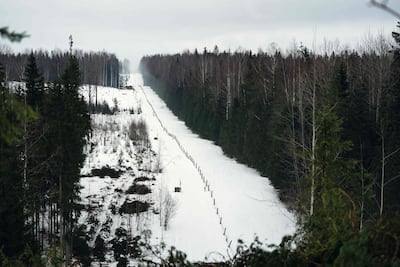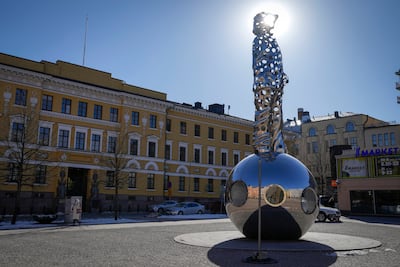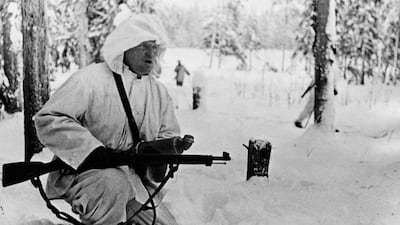Finland’s decision to join Nato marked a decisive shift in the country’s long ambivalence towards embracing western institutions while adopting a more conciliatory attitude towards its neighbour Russia, security experts have told The National.
Its Nato membership was confirmed this week — but the Nordic country has long feared being drawn into great power politics, due partly to the lingering trauma of the so-called 1939-1940 Winter War, said Charly Salonius-Pasternak, leading researcher at the Finnish Institute of International Affairs.
The former Soviet Union, which had a population 45 times larger than Finland’s at the time, attacked its neighbour, which was left largely alone as it fought back in what became viewed widely as a heroic national struggle akin to Ukraine’s current resistance to Russia’s invasion.
Finnish soldiers on skis counter-attacked in blizzard conditions, inflicting substantial losses on the Soviet Union, which ultimately made territorial gains in what was previously southern and north-eastern Finland.
Winter War
Nato secretary general Jens Stoltenberg on Tuesday referred to the conflict as one of the reasons that had prompted Finland to join the alliance, drawing parallels between the Winter War and Russia’s invasion of Ukraine.
“Finland also has a history that tells them about the brutality that a war can afflict on a country like you now see in Ukraine, and like Finland saw during the Winter War,” he said.
Finnish public opinion started to shift after Russia in December 2021 issued a list of demands to Nato, which would have barred Finland from becoming a member of the alliance. The subsequent invasion of Ukraine further galvanised Finland's Nato ambitions.
“Freedom of choice was very important for Finland,” said Nicholas Lokker, research assistant for the Transatlantic Programme at the Washington-based Centre for a New American Security.

Despite a lingering fear of a Russian attack, many Finns for a long time thought that their country could juggle between the West and Russia.
They viewed Nato membership as a US imperialist tool that could draw them into larger conflicts in which they feared they would be left isolated — as they were during the Winter War, explained Mr Salonius-Pasternak.
Building defences
In parallel, Finland participated in peacekeeping operations, starting in 1996 with the contribution of a battalion to a Nato-led peacekeeping force in Bosnia and Herzegovina.
Helsinki also invested heavily in its own defence and in 2021 announced it would buy F-35 jets from the US for $9.4 billion to replace its ageing F/1-18 combat planes.
It has maintained a mandatory military service and its army has 280,000 members, mostly reservists.
“There is a fundamental fear of being left alone,” said Mr Salonius-Pasternak.
“Finland tried to portray itself as non-aligned but under the surface, if you look at Cold War history, there is all this talk about brotherly love vis-a-vis the Soviets and trying to assuage Soviet paranoia about a Finnish invasion."

“At the same time, it integrated into western institutions — first the UN, then the European Free Trade Association [in 1961] and so on.”
Finland joined the EU alongside Sweden in 1995. The two countries also jointly filed their request to join Nato in May 2022 — although Sweden has been left in limbo due to Turkish opposition.
What next for Finland, Nato and Russia?
So, what comes next for Finland?
As expected, Russia has reacted angrily, describing the move as an “assault” on its security, but has given no indication of a military response.
Nato has been unclear about the next steps.
Finland’s 1,300km border with Russia and its strong military capabilities bring important new assets to the alliance.
Mr Stoltenberg on Tuesday said Nato had so far not discussed deploying troops to Finland, which will be expected to contribute to the alliance’s operations.
The lack of clarity may reflect genuine indecision linked to Nato’s overall defence replanning process, Mr Salonius-Pasternak suggested.
Finland has no need of ground troops thanks to its large army, he added, arguing that the next logical step for the country would be to position stocks and missiles for joint use with allies.

“It seems like the most cost-effective and rational way to approach things,” he said.
Meanwhile, Mr Lokker said a Russian reaction should not be ruled out.
The Kremlin is particularly sensitive about Nato potentially focusing military resources in north-east Finland, which is close to Russia’s Northern Fleet base in the Kola Peninsula, where it keeps nuclear submarines.
“Russia uses them as the guarantor of their second-strike nuclear capability — if they are attacked first, they would enable them to respond,” said Mr Lokker.
“It’s important to make sure that the integration of Finland into Nato is done in a slow and predictable manner to mitigate as much as possible an increase in tensions with Russia,” he said.


